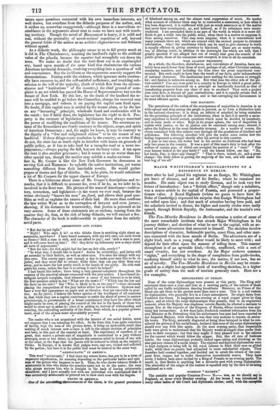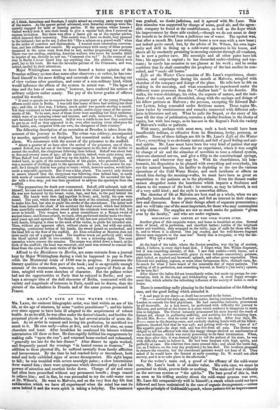MAJOR WHITTINGHAM'S RECOLLECTIONS OF A RESIDENCE IN BERLIN.
SOON after he had joined his regiment as an Ensign, Mr. Whittingham got leave of absence, and set off for Berlin ; where he remained ten months. His main object was to study German, and he took very few letters of introduction : but a "British officer," though only a subaltern, was a scarce article in the capital, of Prussia, and possessed a propor- tionate value. A Royal Hig,hneds (whom we guess to have been the Duke of Cambridge) expressed his surprise that Ensign Whittingham had not called upon him ; and that mark of attention having been paid, and the subaltern invited to dinner, the higher and courtly circles were easily opened, through British Royalty, the Ambassador, and the tourist's own friends.
The Ten-Months Residence in Berlin contains a notice of some of the more remarkable incidents that struck Major Whittingham in his journey thither; and sketches of what he saw in the capital, with an ac- count of some adventures that occurred to himself. The sketches involve descriptions of character, fashionable parties, court fetes, and other mat- ters connected with the beau monde of Berlin. The adventures are of a slight kind, such as a young officer would be likely to meet with; and depend for their effect upon the manner of telling them. This manner throughout is of an agreeable kind,—lively, unaffected, with a sort of smart vivacity, but not overdone. As the Major eschews common "sights," and everything in the shape of compilation from guide-books, confining himself solely to what he saw the matter, if not new, has an air of novelty. The Ten-Months Residence in Berlin may be recom- mended as a slight but agreeable book of travelling sketches, in a higher grade of society than the mob of tourists generally reach. Here are a few examples.
DIPLOMATISTS AT BERLIN.
None of the corps diplomatique were present at this party. The ring only entertains them once a year, and that at a morning party, of the nature of those called by our Gallic neighbours dancing breakfasts. Moreover, no Prince of the Blood can ask them to his parties more than once a year. This is a sad custom for diplomatists, who generally live in a Court atmosphere. Its origin dates from Frederick the Great. It happened one evening at a royal supper given by that prince, and at which the corps diplomatique were present, that in an unguarded moment, when his Majesty was smplenus veteres Baochi, he allowed a sarcasm to escape him at the expense of the Empress of Russia, whose character was any- thing but immaculate. A few days later, Frederick received information from his own Minister at St. Petersburg that his unfortunate bon-mot had been reported to her Imperial Majesty, with whom he was then very anxious to remain on amica- ble terms. Thaing' naturally disgusted at being thus betrayed in what he con- sidered the privacy of his social hours, declared that none of the corps diplomatique should ever sup with him again. At the next evening party, that respectable body were given to understand that his Majesty would at supper-time prefer their room to their company; but that they might if they pleased wait in the saloons for the concert which would follow the supper. But, like all men of business habits, the corps diplomatique probably looked upon eating and drinking as the sine guti non clauses of a social treaty. The rejected and dejected diplomatists were in high dudgeon at being left in the royal saloons to feast their eyes on gilded walls, while their co-guests had adjourned to more substantial repasts. They therefore held counsel together, and decided not to await the return of the coin- pany from supper, but to make themselves immediately scarce. They, hare never, I believe, been since invited by a King of Prussia than evening party. The result is, that Berlin is anything but a favourite post with young diplomatists. The absurdity of the origin of the custom is equalled only by the fact of its being continued as a rule.
FOREIGN "SOCIETY." The amiable and popular Countess P— N— was, as we should say England, at home every Monday evening. At her house I was introduced to many other ladies of the Court and diplomatic circles; until, with the exception of, I think, Saturdays and Sundays, I might attend an evening party every night of the season. As the gayest period advanced, even Saturday evenings were fre- quently engaged for balls or dancing parties. If the persons whose houses I visit- weekly took it into their heads to give a regular ball, then I received an express invitation. But there was often a dance got up at the regular soirees, which lessened their monotony. This society was, I have no doubt, very pleasant to the initiated: but as for me, I often felt "like a salmon on a gravel-walk" when in the midst of courtiers and diplomatists. I wanted more interesting conversa- tion, and less stiffness and reserve. My acquaintance with many of those persons remained in the same state from first to last, neither progressing nor receding. There was one smiling, smirking, Austrian waltzer, who never for months failed to inquire of me, directly he saw me, "Comment s'en va ? " In the course of my stay, in Berlin I never heard him say anything else. His abilities, which were good, lay in his heels. He was the favourite partner of the Princesses, and was, indeed, spoiled by their attentions.
Major Whittingham seems to have formed a better opinion of the Prussian military system than some other observers ; or rather, he has con- fined himself to the mere drilling and externals of the matter, leaving out of view various other questions, and some of a non-military kind, which would influence the effects of the system in actual war. "The lapse of time and the loss of some notes," however, have rendered his notices of military subjects rather scanty. The pay of the lower grades of officers excited his wonder.
It used to puzzle me to conceive how the greater part of the young Prussian officers could mast in Berlin. I was told that many of them had nothing but their pay; and this at first was, I believe, much under two pounds sterling a month. Yet they continued to look respectable in public, and to enjoy many of the amuse- ments of life. To be sure, most of them never wore anything but their uniforms; which were of an enduring colour and texture, and were, moreover, I believe, in part furnished by the Government. Still it was a riddle to me how they contrived to get on as well as they appeared to do, even after making every allowance for their habits, and, compared with our own, the cheapness of their country."
The following description of an execution at Dresden is taken from the account of the journey to Berlin. The crime was robbery, accompanied by murder, apparently not designed, but committed under a feeling of alarm. We commence with the ascent of the prisoners to the scaffold.
"About a quarter of an hour after the arrival of the prisoners, one of them, named Bakoff, was led out of the lower compartment to the foot of the ladder to mount the scaffold, the clergyman following close behind. Bakoff was about four or five-and-twenty years of age: all the convicts, indeed, were quite young men. When Bakoff had ascended half-way up the ladder, he hesitated, stopped, and looked back, in spite of the remonstrances of the gaoler, who preceded 'in. It was a moment of thrilling pain to the spectators. At least, I can answer for my- self; for I thought thathe was going to resist: which, however useless, would have made a miserable spectacle. But it was a false alarm. The convict only desired to assure himself that the clergyman was following close behind him, to sooth with words of consolation his already numbered moments. He ascended the lad- der with a firm step; and was then permitted to addre.ss the spectators from the scaffold.
"The preparations for death now commenced. Bakoff, still unbound, took off, himself, his coat and braces, and then sat down in the chair previously mentioned. Re was now fastened by the breast, waist, legs, and feet, to the post behind the chair. His bands were then tie4,together in front; and, lastly, his eyes were bona The post, which rose as'Ingt as the neck of the criminal, served not only to make him fast, but also to guide the stroke of the executioner. The latterinow took from beneath the cloak of his assistant the fatal sword, which had hitherto been mercifully concealed—that sword which the criminals were soon to fed, but never to behold. This weapon bore a great resemblance to a Roman sword of ancient times; and Roman swords, we learn, often performed similar tasks two thou- sand years ago and upwards. The finisher of the law now poised his weapon with both hands, bringing it close to the neck of the victim, to guide his intended aim. Then, without any apparent effort, without strain or jerk, but with one quick, sweeping continuous motion of his hands, the sword passed on unchecked, and the head 'fell on the floor of the scaffold. An Eton schoolboy at Montem does not more easily cut off a poppy's head. The headless trunk sat perfectly still; while the blood spirted aloft in two conduits. It was a sickening sight. The next operation was to remove the remains. The corpse was slided down a board, at the back of the scaffold; the head was removed; and sand was strewed to conceal the blood from the eyes of the next victim of the law."
Affixed to the Residence in Berlin, are some extracts from a journal kept by Major Whittingham during a visit he happened to pay to Paris while the Ministerial crisis of 1839 was in progress. It possesses the literary qualities of the first part of the book ; and is an agreeable enough account of the restaurants, rumours rows, and reports of Paris at the time, mingled with some sketches of character. But the gallant writer had not the opportunities at Paris that he enjoyed in Berlin ; and per- haps a stronger idea of the dull character of Berlin, contrasted with the variety and magnitude of interests in Paris, could not be drawn, than the picture of the subaltern in Prussia and of the same person promoted in France.



























 Previous page
Previous page